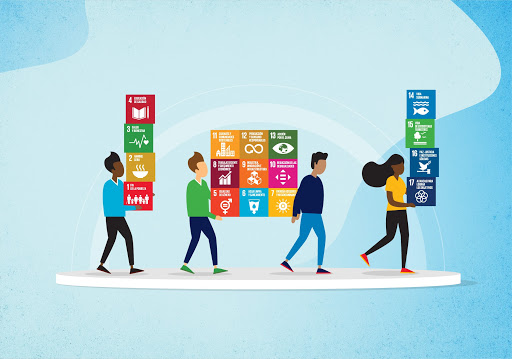Chetna Kaura, Head Corporate Social Responsibility, India, Publicis Sapient.
The ongoing COVID-19 pandemic, whilst imposing social distancing, has also galvanized all of humanity to come together to meet this challenge, and be motivated by a single purpose – to save lives. Nearly five years ago, another challenge, development that balances social, economic and environmental sustainability, brought all of humankind on the same page to be guided by a single framework – the Sustainable Development Goals (SDGs).
Just like it is everyone’s responsibility to help stop the spread of this virus, everyone is needed to reach the ambitious, but necessary, targets to end poverty, protect the planet and ensure that all people enjoy peace and prosperity by 2030, as espoused under the SDGs.
Unlike the Millennium Development Goals, the SDGs were framed involving a multitude of stakeholders including the private sector. It was envisaged that creativity, know-how, technology and financial resources from all of society was necessary to achieve the SDGs in every context.
In February 2020, I was part of a national consultation, ‘Role of the Private Sector in Achieving the SDGs’, which was contributing to the preparation of India’s Voluntary National Review for 2020, as part of the follow-up and review of the 2030 Agenda for Sustainable Development undertaken by signatory nations. The discussions during this workshop made me more aware of the landscape of the SDGs vis-a-vis the private sector in India.
There are companies like Publicis Groupe that have global annual corporate social responsibility (CSR) reports that have been inspired by the Practical Guide: Integrating the SDGs into Corporate Reporting developed by the Global Reporting Initiative and the United Nations Global Compact. I’m sure this year we will also see some of the B Corp Certified global companies with an Indian presence, like Danone, use the recently-launched SDG Action Manager developed by B Lab and United Nations Global Compact.
Whilst there are other companies that are focused on mapping their contributions to the SDGs –through core business activities as well as CSR, such as the Tata Group, Ericsson and the Mahindra Group without using the above reporting frameworks.
Therefore, most companies with global links were formally reporting or mapping their contributions to the SDGs, and it was heartening to learn that even companies that began their journey with the advent of Section 135, Companies Act 2013, were informally aligning their CSR projects and programs to the SDGs.
The surprising revelation was that, even though in India we have the Section 135 mandated annual reporting to the Ministry of Corporate Affairs, and the Business Responsibility Reporting required by the Securities and Exchange Board of India (SEBI), both these reports require no information on the SDGs. As such, all the impact made in the last five years by the CSR activities of more than 20,000 companies investing around INR 52,624 crores (figures – National CSR Portal) has not been taken into account in the India SDGs story till date.
Whilst the Voluntary Annual Review for India undertaken by the NITI Aayog captures anecdotally the role of the private sector in meeting India’s targets for the SDGs it developed the SDG India Index, 2018 and the improved SDG India Index 2019 and Dashboard. This not only gives an assessment of the progress made by the States and the Union Territories towards the attainment of SDGs, but also attempts to measure the incremental progress since the previous year, thus highlighting their pivotal role as drivers of the SDGs.
It is almost universally acknowledged that India’s success in achieving the SDGs will largely determine the global outcomes, and India’s success is incumbent not only on its government but all the possible stakeholders including the private sector. Also, the implementation of SDGs is incomplete without constantly measuring the progress of actual outcomes under each of the 17 Goals. Hence, it becomes the responsibility of the NITI Aayog, mandated to oversee the progress of the nation along the SDGs to close this loop by:
Developing a suitable measurement and monitoring tool to track private sector input
Leveraging the information contained in the existing CSR and business responsibility reporting frameworks
Advocating the alignment of Schedule VII, Companies Act 2013 to all or at least some of the 169 targets of the 17 Sustainable Development Goals and
Ensuring that information on the activities related to the SDGs undertaken by companies is included in the mandatory reports.
Views of the author are personal and do not necessarily represent the website’s views.
 Chetna Kaura leads Corporate Social Responsibility for Sapient pan-India, primarily focussing on the requirements under Indian Law while also facilitating linkages of CSR to multiple stakeholders across the business within India and globally. She has lived and worked in the UK and Australia. She was one of 20 professionals selected from across the country for the CSR and sustainability-focused Swedish Institute Management Programme.
Chetna Kaura leads Corporate Social Responsibility for Sapient pan-India, primarily focussing on the requirements under Indian Law while also facilitating linkages of CSR to multiple stakeholders across the business within India and globally. She has lived and worked in the UK and Australia. She was one of 20 professionals selected from across the country for the CSR and sustainability-focused Swedish Institute Management Programme.
To read more stories by Publicis Sapient, click here.
Thank you for reading the column. Please drop a line and help us do better.
Regards,
The CSR Journal Team


